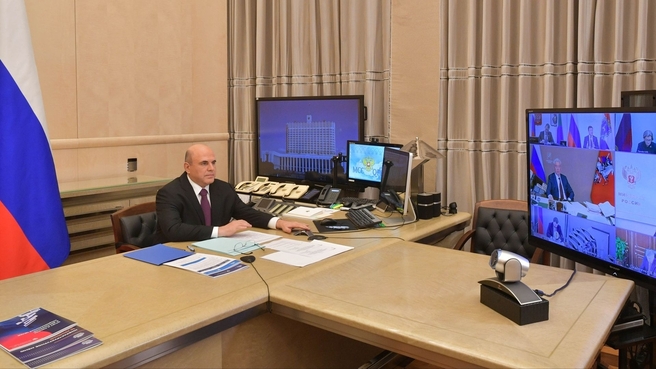Excerpts from the transcript:
Mikhail Mishustin: Good afternoon, colleagues.
The non-working days announced by the President are over. The non-working regime has been extended in five regions of the Russian Federation. The local authorities have adopted this decision based on the recommendations of health officials and the epidemiological situation in these regions.
Anti-coronavirus efforts have been redoubled throughout the country, and these include the disinfection of public transport, taxis and public places.
As per the President’s instructions, we are increasing the testing for the COVID-19 infection. Over a thousand laboratories are involved.
The vaccination is ongoing. Overall, nearly 80 million vaccine doses have been sent to the regions.
Those who have received the jab are given vaccination certificates, and this information is automatically added to the database of the public services portal. From 16 November onwards, the certificates will be available in paper form at the multifunctional public services centres. This suits many people. A Government resolution to this effect has been signed. I would like to ask the Ministry of Digital Development to ensure the necessary technical arrangements by the end of the week so that this service is provided to people without fail, quickly and conveniently. I would also like to ask the Healthcare Ministry to coordinate and approve the procedure with the concerned agencies.
I would like to draw your attention to one more thing. The pandemic has had a serious impact on all areas of our life, including the labour market. Last year, the Government established a temporary procedure for registration in the labour market to protect people’s health.
The President emphasised that this procedure should be as easy as possible. We adopted decisions to this end. The procedure gives people an opportunity to register as unemployed remotely, either through the website Work in Russia or the Government services website. This spared people from having to stand in queues and visit authorities. This procedure became much more convenient.
We will continue this practice. People who are looking for work or have lost their job will be able to register on the Work in Russia integrated digital platform in the future, too. The first 19 regions will start working in the new format this month. More than 60 regions will join them in January. Moscow will follow suit in a year. The temporary procedure for filing unemployment will be in force until then. At the same time, the Government will continue developing remote services for job seekers. The majority of these services will be automated. The transition to an integrated digital platform will allow people to look for a job regardless of their place of residence. Inter-departmental cooperation will make it no longer necessary for people to collect a huge package of documents. To get a job through employment centres, it will be enough to email an application and resume, that is, information about one’s qualifications and work experience. That said, people will have the opportunity to go to employment centres in person, if they find it more convenient.
Let’s discuss the efforts to counter the coronavirus infection in the country. I would like to ask Mr Sobyanin to take the floor. What is the situation in Moscow today? What was the impact of the restrictions that were in force for the past few days? How are new cases of infection detected? I would also like to ask you for an update on Moscow’s progress on vaccination.













